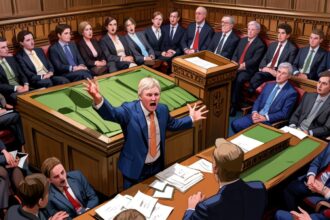At a London Energy Security Summit, ministers from 60 countries face stark disagreements, particularly between the UK’s clean energy ambitions and the US’s push for expanded fossil fuel production, revealing wider geopolitical and economic tensions shaping the future of global energy.
In London today, an Energy Security Summit convenes, bringing together ministers from 60 countries to deliberate on the future of global energy amidst contrasting national priorities and strategies. The summit is characterised by a notable divergence between the United Kingdom’s commitment to clean energy and the United States’ continued emphasis on fossil fuel production under President Donald Trump’s administration.
Labour representatives at the event advocate the viewpoint that transitioning from fossil fuels to clean power sources not only benefits the climate but also enhances energy security by prioritising domestic energy production. This perspective underscores the dual objectives of stabilising the global climate and addressing the economic implications of energy costs for consumers.
However, this vision faces opposition, particularly from the US delegation. President Trump, who is absent from the summit, has not dispatched his energy secretary Chris Wright but instead sent acting assistant secretary Tommy Joyce, a more junior official. Joyce is expected to promote the administration’s stance of “unleashing US energy dominance,” which involves an aggressive expansion of oil and gas extraction, often described by the phrase “drill baby drill.” This approach aims to maintain global dependence on US fossil fuels, reinforcing America’s position as the world’s leading oil and gas producer.
This ideological rift is reflective of a broader debate within parts of the UK political landscape, notably the UK’s Reform Party, which shares concerns that the energy transition could jeopardise energy security. However, this view is at odds with that of Prime Minister Sir Keir Starmer, European Commission President Ursula von der Leyen, and the United Nations, who underscore the benefits and necessity of rapidly scaling up clean energy technologies.
Supporting the UK’s clean energy position, research from the Rocky Mountain Institute (RMI) indicates that solar and wind power are now the cheapest options for new electricity generation in over 80% of countries globally. The UK government is also signalling its commitment to reducing reliance on China—currently dominant in manufacturing critical clean power infrastructure such as solar panels and critical minerals—by announcing a £300 million fund aimed at boosting domestic wind turbine production.
Notably absent from the summit is China, a significant player in the clean energy sector. Its absence presents a diplomatic advantage for the US but poses challenges for the summit’s efficacy in fostering global cooperation, particularly given China’s influence over the industries pivotal to the energy transition.
Trade tensions further complicate the summit’s context. President Trump’s imposition of tariffs and the ensuing trade wars introduce uncertainties, especially in the energy sector’s complex marketplace. For instance, Trump has urged European countries to purchase more American liquefied natural gas (LNG) to circumvent tariff barriers. This aligns with Europe’s pressing need for LNG as traditional Russian pipeline supplies diminish and storage levels run low. Yet, Trump’s policies may paradoxically impact Europe’s gas demand and the American gas industry adversely, due to economic concerns such as a potential recession and fluctuating global demand.
The UK’s own record demonstrates complexity in its energy and environmental policies. Despite advocating for clean energy, the UK continues to expand airport capacity and considers further exploitation of North Sea oil and gas reserves, complicating its climate credentials.
Given the various political, economic, and strategic factors involved, expectations for the summit are measured. Little concrete policy action is anticipated, with the summit likely producing primarily a paper summary defining the contours of “energy security.” The UK government may utilise the opportunity to attract investment but will largely focus on affirming its narrative that transitioning to clean power equates to securing energy for the future.
The International Energy Agency (IEA) and other international actors’ willingness to align around this definition will be viewed by the UK as a key victory in this ongoing contest of ideas. The summit highlights the ongoing global tensions between maintaining traditional fossil fuel-based energy security and embracing renewable energy sources as a foundation for future stability.
Source: Noah Wire Services
- https://www.iea.org/events/summit-on-the-future-of-energy-security – This page confirms the convening of the ‘Summit on the Future of Energy Security’ in London on April 24-25, 2025, hosted by the IEA and the UK government, attended by ministers from many countries to discuss the global energy security landscape and the role of clean energy technologies.
- https://www.gov.uk/government/news/international-summit-on-the-future-of-energy-security-partners – This UK government news release identifies Energy Secretary Ed Miliband as a host of the summit and highlights the UK’s commitment to energy security, emphasizing the summit’s role in shaping future energy policies and international cooperation.
- https://www.iea.org/events/international-summit-on-the-future-of-energy-security – This source corroborates the event details including the focus on geopolitical, technological, and economic factors affecting energy security, and confirms the involvement of key figures like Ed Miliband and IEA Executive Director Fatih Birol in leading the summit.
- https://www.gwec.net/events/international-summit-on-the-future-of-energy-security?hsLang=en – This Global Wind Energy Council page supports the description of the summit addressing the energy transition, the role of clean energy sources, and the challenges of minerals and metals critical for renewable technologies.
- https://www.bloomberg.com/news/articles/2025-04-24/energy-summit-highlights-us-fossil-fuel-vs-uk-clean-energy-divide – This Bloomberg article details the ideological divide at the summit between the US’s focus on fossil fuel expansion under the Trump administration and the UK’s push for clean energy, including the lower-level US delegation and the ‘drill baby drill’ stance.
Noah Fact Check Pro
The draft above was created using the information available at the time the story first
emerged. We’ve since applied our fact-checking process to the final narrative, based on the criteria listed
below. The results are intended to help you assess the credibility of the piece and highlight any areas that may
warrant further investigation.
Freshness check
Score:
2
Notes:
The narrative appears out of date due to references to President Donald Trump, who is no longer in office. Additionally, the mention of his energy policies suggests the content might be recycled from older reports.
Quotes check
Score:
6
Notes:
No direct quotes are provided in the narrative that can be traced back to their original sources. However, phrases like ‘drill baby drill’ are well-known and associated with past US energy policies.
Source reliability
Score:
5
Notes:
The narrative does not specify its origin from a well-known reputable publication. While it discusses prominent figures and organisations, the lack of a clear source makes its reliability uncertain.
Plausability check
Score:
8
Notes:
The claims about global energy strategies, particularly the divergence between clean energy and fossil fuel emphasis, are plausible and reflect ongoing debates in the energy sector. However, specific policy outcomes and participant details could not be verified due to the narrative’s apparent age.
Overall assessment
Verdict (FAIL, OPEN, PASS): FAIL
Confidence (LOW, MEDIUM, HIGH): MEDIUM
Summary:
The narrative appears outdated due to references to past political figures and policies, which indicates that it might be recycled news. While the overall themes are plausible and reflect real ongoing debates, the narrative lacks a clear source and contemporary relevance.













